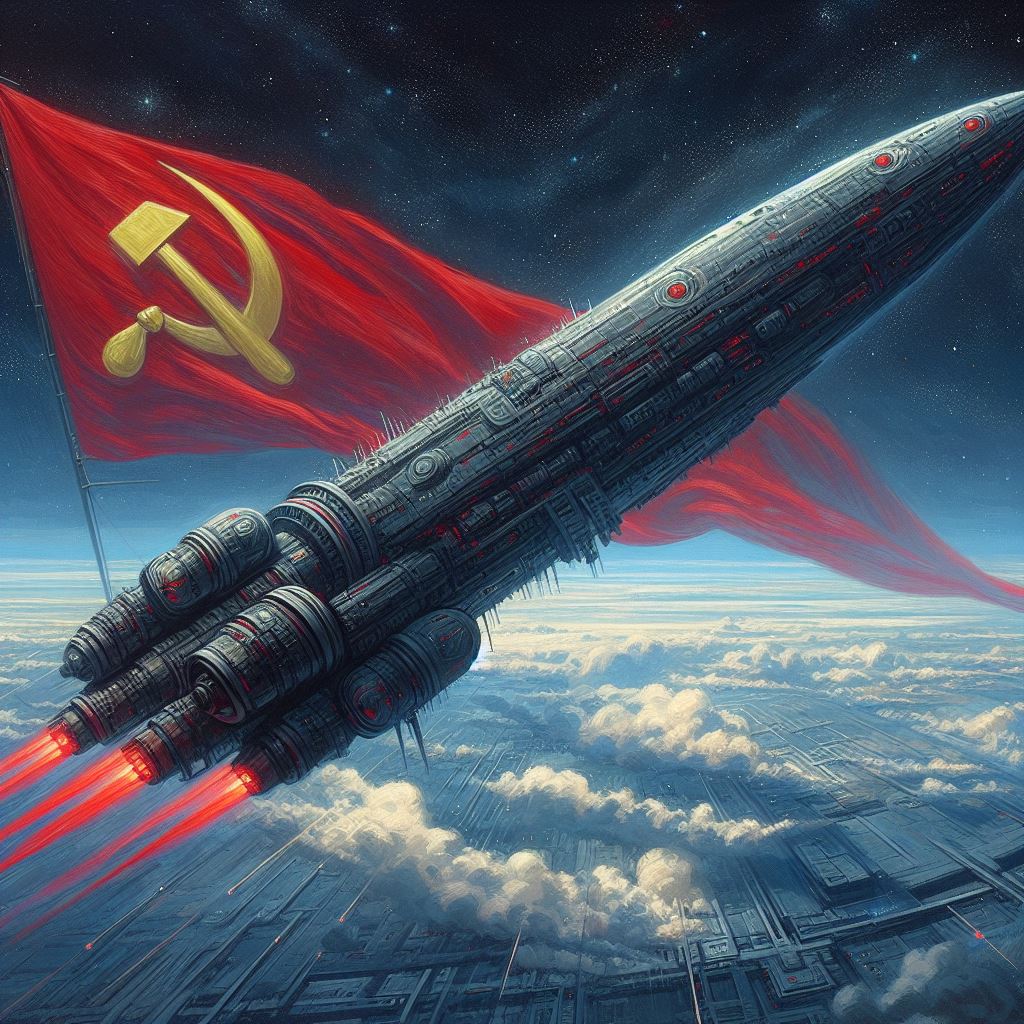Me and my girlfriend pretty often have heated but respectful political discussions and recently we were discussing Stalin. She thinks that he was awful, mainly because of repressions, cult of personality etc.
When I say that repressions were actually good and Stalin didn’t kill enough fuckers, she gets a little angry, but I can’t seem to explain my position in great detail because of lack of knowledge.
In the case of the cult of personality, I say that Stalin WAS loved by the majority of soviet citizens because he did a shit ton of good for them, but she still doesn’t quite get it.
What arguments would you suggest to use, or maybe something to read in order to deepen my knowledge on the topic?
Like any other Soviet leader, Stalin is the fortress of the Union. Unbreakable, honest.
Stalin good.
Reading Stalin is the antidote!
here’s a couple great interviews of Stalin to start with, one with Emil Ludwig and one with H.G. Wells
When I say that repressions were actually good and Stalin didn’t kill enough fuckers, she gets a little angry
Most of the time you’re not going to reach someone with shock value statements, even if they’re true. We all have to learn to be a bit more diplomatic about this if we want to convince people rather than just drawing a line in the sand and saying “this is where i stand, and if you’re not with me, you’re against me”. That only reinforces divisions and isolates you rather than win people over to your side.
In general there is no one-size-fits-all approach and you have to adapt the way you go about convincing people depending on the personality but also the level of (mis-)education of your interlocutor. Some people respond better to certain approaches than others. Some may need a lighter touch, others more hand-holding.
In some cases they may need to first form a basic foundation of historical knowledge and at least a rudimentary materialist understanding of how the world works, while another person may be already more advanced and only need an extra push. Others may simply need you to make a connection with them and see that you understand their conditions before they are prepared to take in what you have to say.
Perhaps in this case you may want to try a more dry and dispassionate approach of just presenting facts without overly ideological language or value statements. You want to guide the conversation but allow people space to draw their own conclusions, to feel like you didn’t push your viewpoint onto them but that they independently arrived there.
No no, don’t get me wrong, I totally get it. While I think that the statement is true, it’s not the only way I tried to explain my position. Like I said, we are having respectful discussions with one another and I try to not be overly emotional. It’s very important to find a nicer footing in the dialogue in order to convey your thoughts more clearly.
I would suggest that if they are really interested in the subject they should start by reading some of the literature that the other comments have recommended. That’s quite a significant time investment though and not everyone will be interested in doing that. But there’s no magic phrase that you can say that will cause someone to immediately unlearn all the miseducation on this subject that they have been exposed to throughout their life.
The next best thing maybe is to just get people to start asking questions. Where does this narrative about Stalin come from and how can you trust a narrative that comes from the very interests that stand to benefit the most from discrediting communism and its leaders? And what are the people on the other side of this issue saying, how did people at the time who had a different view of Stalin than that which is now taught in the West feel? Isn’t it important to hear both sides out?
But there’s also a question that you should ask yourself, and that is: is this really that important of a battle to be fighting right now and why? What exactly is it about this debate that makes it relevant to our struggles today and is this the best use of your time? For me this was always a fascinating subject because i was always interested in history. But for someone else maybe you need to find other things that appeal to them in order to have them learn about communism.
My suggestion is to not get into extremely pointless historical relitigations with your partner over Stalin. Even if you knew what you were talking about, it would be a shame to tank your relationship over something that doesn’t materially matter to either of you. As it is, you’re repeating profoundly edgy memes to a comparatively normal person and then acting like it’s their problem they are put off by it.
“Stalin didn’t kill enough fuckers” is true, but mainly when you understand “fuckers” to mean “reactionaries imperiling the ML project” rather than just “people.” There were many people, most notably during the “Great Purge,” who were killed by the government and emphatically did not deserve it (“But it was Yezhov’s fault!” true or not, you’d need to establish Ezovchina lore first.)
Someone else will probably handle the other aspects, but if no one does you can ping me
I have learned over the past 3 years to not argue about stuff like that anymore. It’s tiring for me, it strains my relationships, and frankly I’m more and more convinced that it undermines actual present organising. I read a couple of articles and listened to some podcasts on climate change and leninism (i.e. socialist revolution; professor Kai Heron) and their argument is convincing enough. We have bigger fish to fry than internally fighting over who was better 70 years ago. Like waaaay bigger fish: climate change and neo-fascism. Let’s fry those first and then we can discuss Stalin and Trotsky and Chinese reforms and what have you.
An example from my hometowm. Almost every dedicated Marxist grouping here is Trotskyist. It refrains me from joining them but I also haven’t asked them WHY they’re Trotskyist. And also our dedicated communist party renounced its founder because they defended Stalin. Maybe it’s the classic falsehood of “Stalin bad, Trotsky would have been better” or maybe they actually engage with Trotsky’s ideas of permanent revolution and find them more helpful in the 21st century. I don’t know. But this also means that I am left without a serious means of organising in my home city as I don’t have time nor energy to start my own organisation and even so, the zeitgeist here is not one of pro-Stalin. So I don’t argue it and just look at axtual actions on the ground and while Trotskyist, these are the people organising, fighting, getting out etc. So it’s a dilemma.
I would say unless your GF is a fascist or right-winger, don’t bother straining your relationship with this. Just inform yourself and that’s good. (Unless you want to strain your relationship in which case, have at it.).
Use statistics about life expectancy, literacy, and economic development.
And perhaps compare a leader doing it in your own country to what Stalin and ask if people would think highly of such a leader.
At least if you think such a leader would be well seen in your country.
Thank you so much for the links! Started with Another View of Stalin
Domenico Losurdo “Stalin: History and critique of a black legend” is the best book on the topic.
Early USSR was in a permanent state of emergency due to several factors like the backwardness it was found, devastated by war, foreign powers invaded, counterrevolution threats, and the rise of fascism in the west.
Losurdo builds on this foundation for his defense of Stalin, compares his policies to those of the “free” west (these would be called whataboutism by liberals) and, what makes his book special, it exclusively uses anti-communist sources to contradict these narratives.
In the book you will find even quotes of Hitler struggling to comprehend how these primitive people managed to develop, Goebbels accepting that they underestimated their material development, Goebbels enjoying using trotsky to cause unrest, different western leaders praising Stalin prowess, etc…
It’s always an uphill battle because people are way too conquered ideologically, but what i always point out is that the USSR under his leadership defeated Nazi Germany and that is something they cannot take away from him.
Would these western leftists have praised Stalin if he didn’t push for rapid industrialization and forced collectivization, and ultimately lead to the USSR being enslaved by Nazi Germany?
Would these western leftists…
Yes. The western left loves the communists who were crushed.
You would hear “Stalin would have built a much better nation than Mao did.” Just like you hear about Trotsky.
and that is something they cannot take away from him.
I tried pointing that out to a family member and guess what - they did just take it away from Stalin by repeating the same tired bullshit that the USSR wouldn’t have lasted without western help and so it was the western allies that really beat the nazis. Which is factually wrong and implies Soviet lives were worthless (could US guns shoot on their own?), but that’s what you get when arguing with racists
But even for less reactionary people, defending Stalin is the final boss of deprogramming them
Tankies [1] don’t usually believe that Stalin or Mao “did nothing wrong”, although many do use that phrase for effect (this is the internet, remember). We believe that Stalin and Mao were committed socialists who, despite their mistakes, did much more for humanity than most of the bourgeois politicians who are typically put forward as role models (Washington? Jefferson? JFK? Jimmy Carter?), and that they haven’t been judged according to the same standard as those bourgeois politicians. People call this “whataboutism” [2], but the claim “Stalin was a monster” is implicitly a comparative claim meaning “Stalin was qualitatively different from and worse than e.g. Churchill,” and I think the opposite is the case. If people are going to make veiled comparisons, us tankies have the right to answer with open ones.
To defend someone from an unfair attack you don’t have to deify them, you just have to notice that they’re being unfairly attacked. This is unquestionably the case for Stalin and Mao, who have been unjustly demonized more than any other heads of state in history. Tankies understand that there is a reason for this: the Cold War, in which the US spent countless billions of dollars trying to undermine and destroy socialism [3], specifically Marxist-Leninist states. Many western leftists think that all this money and energy had no substantial effect on their opinions, but this seems extremely naive. We all grew up in ideological/media environments shaped profoundly by the Cold War, which is why Cold War anticommunist ideas about the Soviets being monsters are so pervasive a dogma (in the West).
The reason we “defend authoritarian dictators” is because we want to defend the accomplishments of really existing socialism, and other people’s false or exaggerated beliefs about those “dictators” almost always get in the way — it’s not tankies but normies [4] who commit the synecdoche of reducing all of really existing socialism to Stalin and Mao. Those accomplishments include raising standards of living, achieving unprecedented income equality, massive gains in women’s rights and the position of women vis-a-vis men, defeating the Nazis, raising life expectancy, ending illiteracy, putting an end to periodic famines, inspiring and providing material aid to decolonizing movements (e.g. Vietnam, China, South Africa, Burkina Faso, Indonesia), which scared the West into conceding civil rights and the welfare state. These were greater strides in the direction of abolishing capitalism than any other society has ever made. These are the gains that are so important to insist on, against the CIA/Trotskyist/ultraleft consensus that the Soviet Union was basically an evil empire and Stalin a deranged butcher.
There are two approaches one can take to people who say “socialism = Stalin = bad”: you can try to break the first leg of the equation or the second. Trotskyists take the first option; they’ve had the blessing of the academy, foundation and CIA money for their publishing outfits, and controlled the narrative in the West for the better part of the last century. But they haven’t managed to make a successful revolution anywhere in all that time. Recently, socialism has been gaining in popularity… and so have Marxism-Leninism and support for Stalin and Mao. Thus it’s not the case that socialism can only gain ground in the West by throwing really existing socialism and socialist leaders under the bus.
The thing is, delinking socialism from Stalin also means delinking it from the Soviet Union, disavowing everything that’s been done under the name of socialism as “Stalinist”. The “socialism” that results from this procedure is defined as grassroots, bottom-up, democratic, non-bureaucratic, nonviolent, non-hierarchical… in other words, perfect. So whenever real revolutionaries (say, for example, the Naxals in India) do things imperfectly they are cast out of “socialism” and labeled “Stalinists”. This is clearly an example of respectability politics run amok. Tankies believe that this failure of solidarity, along with the utopian ideas that the revolution can win without any kind of serious conflict or without party discipline, are more significant problems for the left than is “authoritarianism” (see Engels for more on this last point). We believe that understanding the problems faced by Stalin and Mao helps us understand problems generic to socialism, that any successful socialism will have to face sooner or later. This is much more instructive and useful than just painting nicer and nicer pictures of socialism while the world gets worse and worse.
It’s extremely unconvincing to say “Sure it was horrible last time, but next time it’ll be different”. Trotskyists and ultraleftists compensate by prettying up their picture of socialism and picking more obscure (usually short-lived) experiments to uphold as the real deal. But this just gives ammunition to those who say “Socialism doesn’t work” or “Socialism is a utopian fantasy”. And lurking behind the whole conversation is Stalin, who for the average Westerner represents the unadvisability of trying to radically change the world at all. No matter how much you insist that your thing isn’t Stalinist, the specter of Stalin is still going to affect how people think about (any form of) socialism — tankies have decided that there is no getting around the problem of addressing Stalin’s legacy. That legacy, as it stands, at least in Western public opinion (they feel differently about him in other parts of the world), is largely the product of Cold War propaganda.
And shouldn’t we expect capitalists to smear socialists, especially effective socialists? Shouldn’t we expect to hear made up horror stories about really existing socialism to try and deter us from trying to overthrow our own capitalist governments? Think of how the media treats antifa. Think of WMDs in Iraq, think of how concentrated media ownership is, think of the regularity with which the CIA gets involved in Hollywood productions, think of the entirety of dirty tricks employed by the West during the Cold War (starting with the invasion of the Soviet Union immediately after the October Revolution by nearly every Western power), and then tell me they wouldn’t lie about Stalin. Robert Conquest was IRD [5]. Gareth Jones worked for the Rockefeller Institute, the Chrysler Foundation and Standard Oil and was buddies with Heinz and Hitler. Solzhenitsyn was a virulently antisemitic fiction writer. Everything we know about the power of media and suggestion indicates that the anticommunist and anti-Stalin consensus could easily have been manufactured irrespective of the facts — couple that with an appreciation for how legitimately terrified the ruling classes of the West were by the Russian and Chinese revolutions and you have means and motive.
Anyway, the basic point is that socialist revolution is neither easy (as the Trotskyists and ultraleftists would have it) nor impossible (as the liberals and conservatives would have it), but hard. It will require dedication and sacrifice and it won’t be won in a day. Tankies are those people who think the millions of communists who fought and died for socialism in the twentieth century weren’t evil, dupes, or wasting their time, but people to whom we owe a great deal and who can still teach us a lot.
Or, to put it another way: socialism has powerful enemies. Those enemies don’t care how you feel about Marx or Makhno or Deleuze or communism in the abstract, they care about your feelings towards FARC, the Naxals, Cuba, DPRK, etc. They care about your position with respect to states and contenders-for-statehood, and how likely you are to try and emulate them. They are not worried about the molecular and the rhizomatic because they know that those things can be brought back into line by the application of force. It’s their monopoly on force that they are primarily concerned to protect. When you desert real socialism in favor of ideal socialism, the kind that never took up arms against anybody, you’re doing them a favor.
If the conversations are something that you want to continue having drill down on any one claim or criticism until you get an idea of what specifics she’s using to feed her opinion.
“Stalin repressed people!” isn’t the same thing as “Stalin repressed the Kulaks!” as far you being able to figure out what her critique is. You can do some historical research on who the Kulaks were, what was happening in the USSR at that time, what other means were attempted before Stalin rolled in the military, what the consequences would have possibly been if the USSR didn’t do anything at all, etc.
If you have these conversations fairly frequently, you can hear her out one day, do some reading on other days, and when this type of conversation starts up again bring the topic back around to something she previously said but being more informed.
Unless its just a thing you two do (being antagonistic towards each other), you don’t even have to set up the conversation as You vs Her. Move into the conversation by reminding her of the thing the talked about previously, it got you thinking about it, and you did some reading and you’d like to share what you’ve learned. Not going to change anybody’s mind immediately but if they’re listening to you and accepting the information, you might stop hearing that particular criticism being used in future conversations.
Using stalin good arguments
Why are you arguing for a position before you know about it? Seems a bit strange
Well I’m not going in completely blind + I can’t know everything about every topic. But I’m seeking more knowledge, thus the reason why I made a post.
I can’t know everything about every topic.
As Mao would say, “No Investigation, No Right to Speak”
This should be the default position when you take on any discussion, and by far the most sensible advice in this thread.
Stalin based
The Proles of the Round Table podcast did several episodes on Stalin. They also did an episode with another podcast about Stalin that is incredibly informative. They also interviewed Grover Furr who is an non-communist historian who has written several book debunking the western lies about Stalin. Dude went into the Soviet Archives expecting to verify all the claims and found out it was all bullshit. His books are a slog to read. He’s writes dry and factual and his obsession with Stalin and fact checking people on it is very autistic in nature. The man is brilliant.
https://prolespod.libsyn.com/special-release-episode-28-grover-furr
https://podtail.com/en/podcast/revolutionary-left-radio/stalin-a-marxist-leninist-perspective/
https://prolespod.libsyn.com/episode-31-stalin-was-a-mensch-a-look-at-the-antisemitism-of-the-ussr
I’d say to scale down said debates to not tank your relationship over that. if the debate is inevitable, the “didn’t kill enough” depoliticize the discussion, and to someone outside our circle you make you look like a lunatic, so the best approach imo is bringing the discussion to context, like the other comrade commented quoting losurdo, recognize the repression but putting into the context the political situation soviet union had at the moment, surrounded by reactionary forces including the assassination attempt on lenin, to at least not end the discussion looking like stalin was a monster that killed people for shits and giggles. critic without autophagy.














